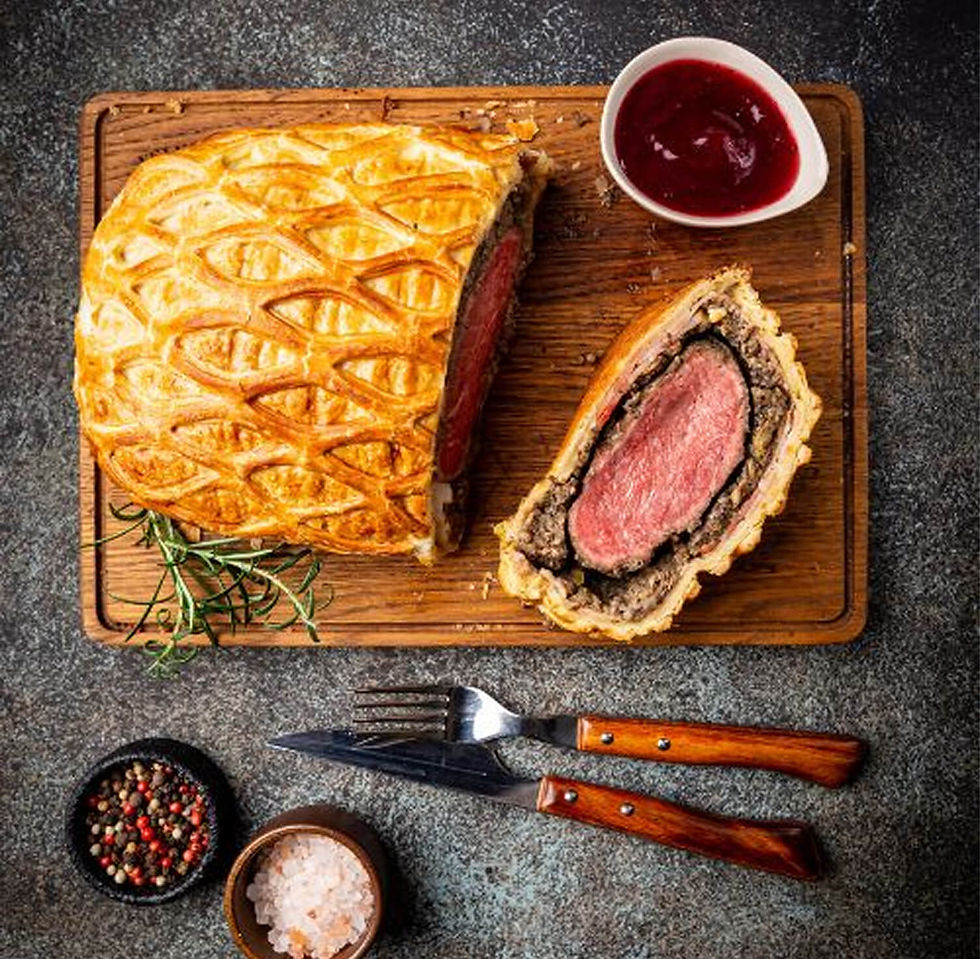Ribollita – Tuscan Minestrone – The Perfect Cold Weather Soup
- May 16, 2021
- 4 min read

Last fall, while visiting Tuscany, I noticed “ribollita” appeared on the menus of every restaurant or café we visited. In getting help translating menus, we found this dish is also called minestra di pane (bread soup) or zuppa di magro (lean soup). Now, I had not heard of “ribollita” before this trip. Curious, I just had to order it. What can I say? This soup was so delicious I had to recreate it when I got home.
One of Tuscany’s most popular soups, it melds the region’s best—bread, cannellini beans and cavolo nero. Although there are as many variations as there are cooks, this hearty peasant potage is normally made with dried cannellini beans, kale, cabbage, carrots, celery, onion, and potatoes. It is traditionally served with chunks of day-old crusty bread, which absorb the delicious vegetable broth, and a good drizzle of olive oil. It is the perfect cold-weather soup.
In Italian, “ribollita” means “boiled again”. Typically, this dish is made one day and then eaten the day following its preparation. The leftover soup is reheated in a pot with a good drizzling of olive oil and then boiled again. Sometimes “ribollita” is served au gratin. For this presentation, the leftover soup is placed in an oven-proof dish, covered with very thin slices of onion, sprinkled with bread crumbs and grated Parmesan cheese, drizzled with olive oil, and then finished in the oven until it caramelizes into a golden au gratin.
Although cities from Livorno to Florence to Siena take credit for its creation, food historians believe “ribolitta” originated during the Middle Ages when feudal lords ate huge banquets of roasted meats. Rather than using plates or cutlery, they served their meat on unleavened bread. At the end of the meal, they gave any uneaten bread to the servants, who boiled it with whatever vegetables and herbs they could scrounge together.
In the Italian countryside, it is customary on Fridays to make a simple soup of beans, black kale, potatoes, bread and a prosciutto bone. Saturday morning this soup is often reheated for breakfast. Renzo Cantagalli in his Guida ai detti toscani refers to this practice as a sort of pre-coffee, a dish for those who take things to heart very early in the morning.
I’m not sure how my family would take to having “ribolitta” for breakfast, but they thoroughly enjoy this dish on chilly autumn evenings. I make my version with chicken broth. If you want a strictly vegetarian recipe, use 8 cups of water. You can use either kale or Swiss chard, whichever you happen to have on hand. Just like the peasants many years ago, it is satisfying to create a delicious dish from whatever ingredients we can scrounge together.
Ribollita – Tuscan Minestrone Serves 6
1 cup dried great Northern or cannellini beans 3 tablespoons extra virgin olive oil 1 cup white onion, chopped 1 cup leek, chopped (white and light green parts only) 1 cup carrots, thinly sliced 1 cup celery, thinly sliced 1 tablespoon minced garlic 1 heaping teaspoon dried Mediterranean basil 6 cups water 2 cups homemade or canned chicken broth 1 can (14 ½ ounces) diced tomatoes, and their juices 2 to 3 cups Savoy cabbage, halved, cored, and cut into ¼-inch wide strips 1 ½ tablespoons sea salt 8 ounces russet potato, peeled and cut into ½-inch dice 8 ounces zucchini, halved lengthwise and cut into ½-inch thick slices 2 cups kale or Swiss chard, stems removed and leaves cut into ½-inch thick strips 6 (1/2-inch thick) slices day-old artisan bread Cut garlic cloves 1 cup grated Parmesan cheese Extra virgin olive oil for drizzling
Rinse and sort through beans to remove any pebbles. Put beans in a large bowl; cover with 3 cups boiling water and soak beans for 1hour. Drain beans in a colander and set aside.
In a large, heavy pot with a lid, heat olive oil over medium-high heat. When oil sizzles, add onion, leek, carrot, and celery and sauté until soft, about 3 to 4 minutes. Add garlic and basil and sauté 1 minute more.
Add 8 cups water, dried beans, tomatoes, cabbage, and salt. Bring to a boil, then reduce heat and cook at a simmer, covered, for 1 hour.
Add potato, zucchini, and chard and simmer, covered, until potato and zucchini are tender and chard has wilted, about 20 to 25 minutes.
To serve: lightly toast bread slices, rub each piece on both sides with cut garlic clove. Place bread slice in the bottom of 6 soup bowls and ladle soup over. Garnish each serving with Parmesan cheese and a good drizzle of extra virgin olive oil.
Carol Ann

Carol Ann Kates is the award-winning author of cookbook, Secret Recipes from the Corner Market and Savvy Shopping Tips. She’s an expert in how to shop, select, and store produce for maximizing home cooking outcomes and minimizing time and money spent. As a former supermarket and deli operator, Carol Ann shares grocery-insider wisdom—the same expertise you used to receive when patronizing a mom-and-pop establishment. Contact her at KatesCarol@aol.com and explore her website, www.CarolAnnKates.com.
@2021 Carol Ann Kates All Rights Reserved Carol Ann Kates is the award-winning author of cookbook, Secret Recipes from the Corner Market, and Expert in How to Shop, Select, and Store Produce for Home Cooking.
1
Searing the Beef
Sear beef fillets on high heat for 2 minutes per side to form a golden crust. Let it cool before proceeding to keep the beef tender.
1
Searing the Beef
Sear beef fillets on high heat for 2 minutes per side to form a golden crust. Let it cool before proceeding to keep the beef tender.
1
Searing the Beef
Sear beef fillets on high heat for 2 minutes per side to form a golden crust. Let it cool before proceeding to keep the beef tender.
1
Searing the Beef
Sear beef fillets on high heat for 2 minutes per side to form a golden crust. Let it cool before proceeding to keep the beef tender.
Notes



1
Season the good fresh beef fillets with salt and black pepper. Heat olive oil in a pan over high heat and sear the fillets for 2 minutes per side until it fully browned. Remove the beef from the pan and brush with a thin layer of mustard. Let it cool.



1
Season the good fresh beef fillets with salt and black pepper. Heat olive oil in a pan over high heat and sear the fillets for 2 minutes per side until it fully browned. Remove the beef from the pan and brush with a thin layer of mustard. Let it cool.



1
Season the good fresh beef fillets with salt and black pepper. Heat olive oil in a pan over high heat and sear the fillets for 2 minutes per side until it fully browned. Remove the beef from the pan and brush with a thin layer of mustard. Let it cool.



1
Season the good fresh beef fillets with salt and black pepper. Heat olive oil in a pan over high heat and sear the fillets for 2 minutes per side until it fully browned. Remove the beef from the pan and brush with a thin layer of mustard. Let it cool.
Instructions
Quality Fresh 2 beef fillets ( approximately 14 ounces each )
Quality Fresh 2 beef fillets ( approximately 14 ounces each )
Quality Fresh 2 beef fillets ( approximately 14 ounces each )
Beef Wellington

Beef Wellington
Fusion Wizard - Rooftop Eatery in Tokyo
Author Name

Beef Wellington is a luxurious dish featuring tender beef fillet coated with a flavorful mushroom duxelles and wrapped in a golden, flaky puff pastry. Perfect for special occasions, this recipe combines rich flavors and impressive presentation, making it the ultimate centerpiece for any celebration.
Servings :
4 Servings
Calories:
813 calories / Serve
Prep Time
30 mins
Prep Time
30 mins
Prep Time
30 mins
Prep Time
30 mins










Comments